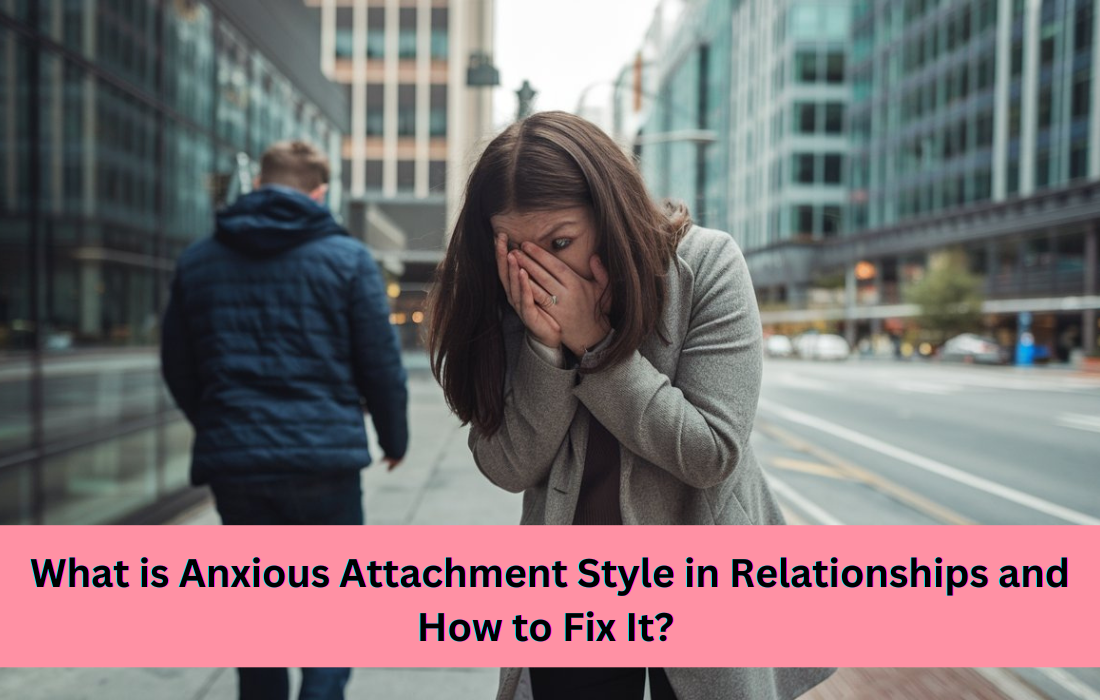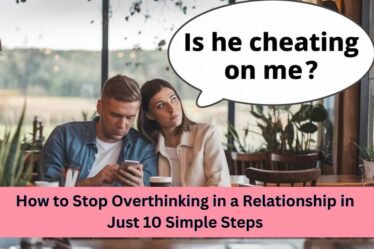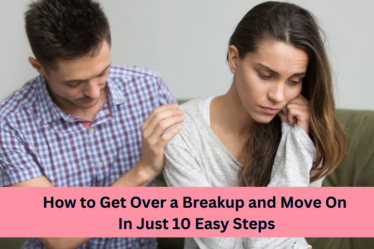
Do you often feel anxious or insecure in your relationship, even though your partner is good enough for you? This might be due to something called an anxious attachment style.
You are in constant fear that your partner might leave you. You need reassurance constantly.
The first step to healing and creating a more secure bond with your partner would therefore be the understanding of this attachment style.
Let us now take a look at what anxious attachment means and how we can fix this.
What is anxious attachment style in relationships?
People with this style often feel insecure in relationships. They fear they aren’t good enough for their loved ones and seek constant reassurance.

They may become emotionally dependent and fear abandonment, often stemming from strict or harsh parenting.
But why do some people remain in particular attachment styles?
For those with anxious attachment styles, their relationships can be difficult, affecting their confidence levels.
In romantic relationships, their trust in others is low, and they tend to have an over-reliance on others.
Signs of anxious attachment style
Anxious attachment is present in roughly 25% of people and it usually develops in childhood based on how we bonded with our parents.

Let’s jump right into the signs.
1. Insecure attachment in relationships
Do you feel that you are not good enough for your partner? Is this affecting your happiness? Anxious attachment makes you feel insecure.
You must probably keep wondering if they could find someone better than you.
As a result, this breeds self-doubt, and you will end up being unhappy. For instance, you start comparing yourself to her ex and start getting anxious when you are not complimented enough.
2. Dangling fear of abandonment
No matter everything seems to go fabulous, you start thinking that one day, they might just walk away. It creates a constant state of worry.
You will start overthinking your partner’s actions.
For example, whenever they go out with friends or leave you for a while, you feel uneasy and can think of the worst thing that might have happened to them.
This fear arises out of childhood experiences.
3. Trust issues
Relationship conflicts generally arise from an insecure mindset. These give birth to constant doubt and suspicion, even when there is no real reason to worry.
Such emotions can make a relationship appear more of a struggle rather than a safe haven.
The person having trust issues will feel paranoid and expects something bad to happen.
For example, if one of the partners casually says that he is hanging out with some other person, trust issues can lead to unnecessary arguments.
4. Clinginess
Have you ever been called clingy? Anxious attachment makes you too dependent on those close to you out of an apprehension that you will be left alone.
Attachment, many times, is rooted in the fear of abandonment.
When you feel overly attached to the partner, you rely on the other person’s presence and attention for emotional security.
For example, if the partner does not immediately respond to a message, the clingy person can freak out.
A clingy person always wants assurance. They become uncomfortable if their partner doesn’t answer right away. They want a part of everything going on in the life of their partner.
The partner may feel suffocated because there is no space and independence. All these eventually build tension between them.
To break this pattern, insecurity should be addressed in order to make a healthier relationship.
5. Emotional neediness
Emotional neediness is one of those things that weights down not only on you but also on the people around you in a relationship.
You tend to lose much of your self-esteem by leaning too heavily on the opinions and validation of others. You become anxious and even sad because you’re always waiting for somebody to affirm their love and commitment to you.
6. Harsh response to criticism
Criticism, even if gentle or constructive, feels like an attack when you have an anxious attachment style.
You tend to believe that the language your partner uses to reject you is criticism in one way or another.
And so even when your partner is only giving you some constructive feedback like: “Take more time for yourself.”.
You end up thinking they are pointing out something wrong with you. That is an insecurity reaction.
You psychologically withdraw from the relationship. You think, well, why bother if they’re anyway going to criticize me?
But if little comments bug you, take a step back and breathe.
Remember that it’s not a judgment on who you are. It is just an opportunity for you to improve or fix something.
7. Ambivalence toward intimacy
Ambivalence to intimacy is a sense of wanting closeness but being afraid of it at the same time.
You feel uncomfortable when someone tries to get close to you on an intimate level.
8. Not good enough
The feeling of being “not good enough” can be directly traced to low self-esteem and self-doubting.
You can always compare yourself to others and think that your partner deserves a better person than you.
9. Jealousy
Sometimes you will feel uncomfortable or nervous when your partner speaks to another person.
In a way, jealousy continues to build up tensions and makes it harder for you to have trust for the other person.
10. Overthinking
Sometimes, things are just simple; the more you think about it, the higher the stress level.
You are overanalyzing every word or action of your partner.
For example, if your partner does not call you back immediately, you start imagining that they probably got upset with you or lost interest in you.
How anxious attachment affects relationships
In a nutshell, then, there are four main attachment styles that describe how we relate to others.
There is the secure attachment style, the avoidant attachment style, the disorganized attachment style, and the anxious attachment style.

We’ll focus on anxious attachment, where one’s constant fear of being abandoned or rejected keeps popping up.
In fact, even things are going well, but this feeling that something might go wrong keeps coming up.
1. Emotional overload:
When you ask your partner repeatedly for confirmation, it may eventually be draining for both of you. You would feel that everything is wrong when in fact everything is normal.
This creates emotional highs and lows; hence, it may show that one or both of you are exhausting and unsure.
2. Constant doubt:
People with anxious attachment will become extremely fixated about whether the other person likes them. Every little action or word from them might be analyzed.
Unfortunately, this attachment can also influence how your partner feels towards the relationship.
3. Demand for reassurance:
In attachment in relationships, anxious attachment manifests in the demand for reassurance.
They may feel nervous or even panicked when they are away from each other, even to the point of feeling abandoned.
4. Jealousy:
Jealousy can also be an issue, more on the part of how the partner might spend time on work or hobbies and less with them.
Often, they want to discuss problems and get safe knowledge that everything is all right, but this may also have a boomerang effect if the tendency is that their partner tends to avoid them.
5. Self-sabotage:
Self-sabotage in relationships often happens due to the feeling that one does not feel ‘good enough’ for the other.
You then create distance that has never been there before, which hurts both of you inappropriately.
The more you push them away, the more you will convince yourselves that doubts were proved right all along-even when they are not.
This creates a repetitive cycle of self-sabotage and prevents you from experiencing the love you deserve.
But it’s not all bad.
However, an anxiously attached person is paradoxically empathetic, emotionally in touch, and deep appreciator of connections.
The silver lining is that you can become more secure in your attachment style.
Root causes of anxious attachment

1. Lack of care in childhood:
Your childhood environment actually shapes how you approach relationships later in life. If growing up you never received consistent care and attention, anxious attachment results.
For instance, if your parents did not often appear available to meet your emotional needs, you might have learned that people are unreliable sources of love and support.
This can make you anxious and bring across to mind a feeling that people will not be there for you.
Consequently, you may always look for affirmations and feel uncertain about your relationships at a later stage.
2. Past trauma:
If you have experienced, loss in your past that causes anxious attachment in a relationship.
For instance, when you once experienced awful breakup, you get overly fearful of ever being abandoned again.
Anxiety will not let you enjoy and relax in the relationship.
3. Fear of rejection:
A basic fear of rejection might stem from experiences in your past when you were unloved or unworthy.
If you have suffered through scenarios in which you felt as though you were worthless or not good enough.
For example, when you were ignored constantly as a child, you will continue fearing that your partner will get bored with you because you are “not good enough”.
How to heal and fix anxious attachment style

1.Acknowledge attachment style:
Take note that you may have an anxious attachment style. That means sometimes you are very clingy with people for reassurance and may get worried about relationships.
Admitting that is a big step. They don’t define you-it’s okay to feel that way. Just that knowledge of your style helps you begin the process of change.
2. Identify your triggers:
Pay attention to what is a trigger for you. Are there certain scenarios or actions from people that make you feel anxious?
Maybe it is the delay of receiving a text message or maybe you are not being informed of your partner’s plans.
The identification of such areas will help you understand what sets off your feelings of anxiousness and begin to manage them better.
3. Communicate openly:
Sometimes, let your spouse, friends, or family know what you are feeling. Share with them everything about you.
It may be awkward the first time but letting them know your needs and fears can make them understand you better.
They will help reduce your anxiety.
4.Therapy:
An attachment therapist can help you understand what makes you attached through anxiety and then guide you through the healing process.
If therapy seems too large at this point, find self-help books and online resources specifically for anxious attachment.
5.Rewire your brain:
Start working on changing the way you think and react. Challenge those thoughts when you’re feeling anxious.
If your thought is, “They’re going to leave me,” ask yourself if that’s really true. Practice new ways of thinking and behaving.
Eventually, your brain learns to do something different, so you feel more secure.
Conclusion
Anxious attachment may seriously impact the relationship you are in.
Therefore, it is very important to be attentive to such signs of anxious attachment and work on changing them for you and your partner so that you can improve the safety and health of your relationship together.
It may not be easy to break free from the anxieties created by anxious attachment, but awareness and efforts can cure the problems.
Here are the key aspects of anxious attachment:
Signs of anxious attachment
1. Insecure attachment:
Feeling less worthy of love from your partner and doubting yourself every step of the way.
2. Fear of abandonment:
Never-ending doubt of being abandoned by your better half in a worst-case situation which then makes you overthink and become anxious all the time.
3. Trust issues:
The more and more you start to suspect and doubt, and what started off as a small issue in your relationship would become the thing that explodes and brings you both to a breaking point.
4. Clinginess:
Dependence on your partner for emotional security and reassurance and a feeling of being suffocated because of it.
5. Emotional neediness:
Inability to look past validation and affirmations from others as well as constant effect upon self-esteem.
6. Overreaction to criticism:
Any positive criticism taken as a personal attack, causing pain and emotional withdrawal.
7. Ambivalence towards Intimacy:
You want to be close, but you are uncomfortable with it.
8. Not good enough:
Continuous low self-esteem compared with others.
9. Jealousy:
Discomfort or tension if your partner has time for others.
10. Overthinking:
Excessive analysis of your partner’s actions that put a burden on your brain, causing unnecessary stress.
Key take-aways to heal anxious attachment:
1. Know your attachment style: Understand you have anxious attachment and know how it will affect your relationship.
2. Identify your triggers: Find what makes you anxious, be it in scenarios or behaviors, and work on controlling your triggers.
3. Open communication: Let out your feelings as well as your requirements to your partner. This is an efficient method to understand one another and gain security.
4. Therapy: You can seek a therapist to learn what keeps your anxiety and worry high and therefore develop a coping mechanism.
5. Recondition your mind: Change the bad thoughts and build your confidence using another thought pattern and behavior.
“Was this helpful”? Share with your friends!”



